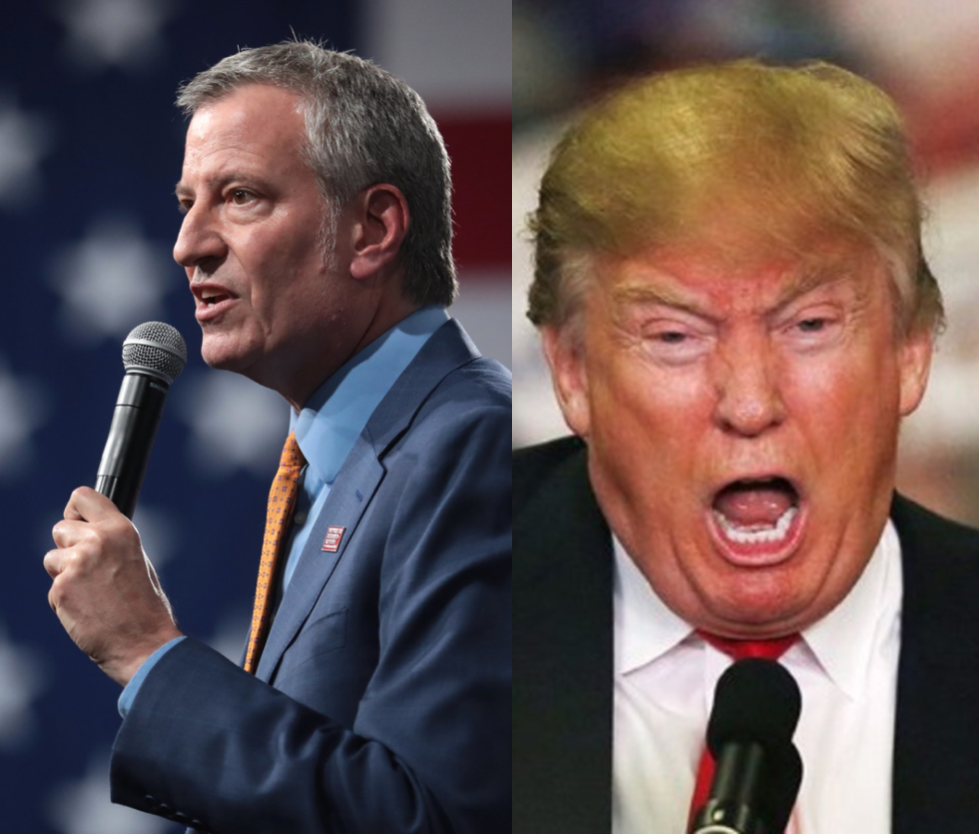President Trump has stayed uncharacteristically silent on the question of whether cities and states will ever get the relief they need during and after COVID-19 — and the mayor of America's largest city is calling him out on behalf of local leaders everywhere.
In a fiery news conference this morning, New York City Mayor Bill De Blasio slammed the president for failing to speak up in support of mayors and governors as the next federal relief bill is negotiated. The revenues that cities and states rely on most to pay for essential services — think sales taxes, property taxes and gas taxes — have been in freefall from virus-related shutdowns, but the first wave of federal relief, the CARES act, largely ignored cities (and short-shifted transit, an urban lifeline).
As he has done a lot recently — including a recent address in which he compared Trump's silence to the infamous “FORD TO CITY: DROP DEAD” headline that became iconic during the 1970's fiscal crisis — de Blasio addressed the president directly. And he did not mince words.
You, Mr. President, are not saying, "I see your burden, I see the fight you're waging, let me offer a helping hand, let me save the day by taking that burden off of New York City." In fact, Mr. President, you know, it was quite clear when the airline industry was in trouble you were quick to act. You gave them $58 billion. But when New York City, and cities all over the country, states all over the country had been pleading in the middle of a huge budget crisis where we can't provide the services that our people need going forward, we're not going to be able to have a recovery, you are absolutely silent.I'm challenging you to open your mouth. I think I may be the first person in history to challenge Donald Trump to speak up. He's not shy.
It was no accident that de Blasio chose the $58-billion airline relief package as his point of comparison. Because when it comes to local transportation, planes got a much bigger bailout than either trains or automobiles — never mind bicycles and pedestrians.
Public transportation got a paltry $25 billion from the CARES act — less than half of what the airlines got, despite the fact that Americans take 616 times as many trips on public transit every year than they do on planes.
And when it comes to surface transportation, every state, territory and tribal area in America has to share a $150 billion pot of Coronavirus Relief Funds. That might seem like a big number, until you consider that funds are allocated proportionally to these regions' respective populations, leaving smaller states in the cold — and the fact that the money has to cover not just road maintenance, but everything else, such as paying firefighters' salaries and keeping sanitation trucks running.
New York State, by way of example, got $7.54 billion from the fund. But New York City alone is expected to need to replace $7.4 billion in lost tax revenue by the end of 2020 — and that estimate has been on the rise since the crisis began.
Experts think surface transport is likely to get shorted.
"City departments of transportation pretty much didn't get any dedicated funding from CARES," said Sindhu Bharadwaj, NACTO policy associate.
Of course, losing funding for car-focused road infrastructure wouldn't necessarily be a bad thing — if cities and states take thoughtful steps to safely de-grow their road networks to a scale they can actually afford, and amp up their non-car infrastructure instead.
But so far, state and local transportation leaders have been heavily focused on maintaining the status quo and keeping planned road maintenance projects on track, even as car travel plunges to ever-more historic lows. The American Association of State Highway and Transportation Officials has been pushing hard for weeks to get state DOTs their own $50-billion bailout, in addition to their perennial calls to save the Highway Trust Fund, which was insolvent long before COVID-19 robbed every toll booth and gas tax coffer in America.
Meanwhile, cities are just trying to stay afloat.
"Our member cities are really just focused on navigating the immediate fallout," said NACTO's Alex Engel. "They’re just trying to keep their workers safe, without a lot of money to even do that."
On the horizon is a bipartisan bill to expand state aid to $500 billion, which is making its way towards a vote. It won't be enough — and it may make matters worse if it ends up being spent on build more roads, a mistake car-crazy leaders have been making for generations.






